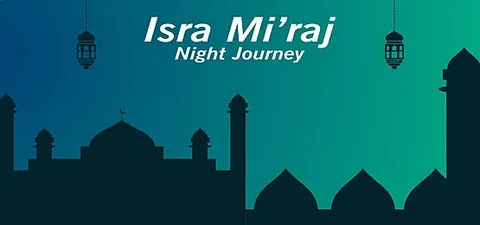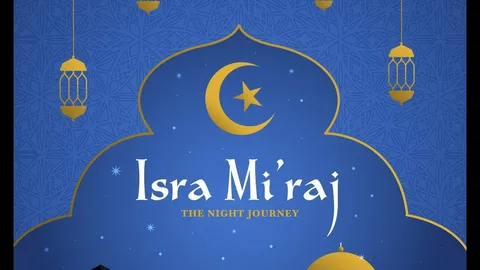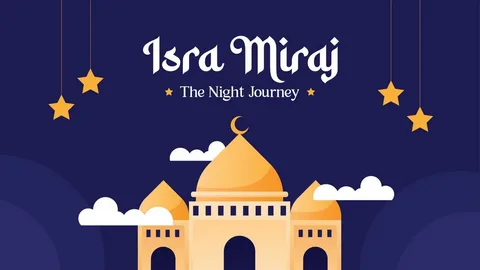The Islamic calendar is filled with significant dates, each carrying historical and spiritual importance. One such remarkable date is 27 Rajab, a night that holds deep meaning for Muslims worldwide. This day is best known for Isra and Mi’raj, the miraculous night journey and ascension of Prophet Muhammad (PBUH). But What is special about 27 Rajab? Why do millions of Muslims commemorate it with reverence? Let’s explore the significance of 27 Rajab and its impact on Islamic faith and practice.
The Importance of 27 Rajab in Islam

What is the significance of the month of Rajab? Rajab is one of the four sacred months in Islam, mentioned in the Quran, during which warfare is prohibited and acts of devotion are highly encouraged. Among the days of Rajab, the 27th night stands out due to the divine event of Isra and Mi’raj.
The Night of Isra and Mi’raj (Lailat al-Mi’raj)
Isra and Mi’raj is a two-part miraculous journey undertaken by Prophet Muhammad (PBUH) in a single night, where he traveled from Makkah to Jerusalem (Isra) and then ascended to the heavens (Mi’raj). This event is regarded as one of the greatest spiritual experiences in Islamic history.
The Journey of Isra (Night Journey)
During this journey, Angel Jibreel (Gabriel) escorted the Prophet from the Kaaba in Makkah to Masjid al-Aqsa in Jerusalem on a heavenly steed called Buraq. Upon reaching Al-Aqsa, Prophet Muhammad (PBUH) led a congregation of all previous prophets in prayer, symbolizing his status as the Seal of the Prophets.
The Mi’raj (Ascension to Heaven)
After the prayer in Jerusalem, the Prophet ascended to the heavens, where he met prophets like Prophet Adam, Prophet Ibrahim (Abraham), Prophet Musa (Moses), and Prophet Isa (Jesus) (peace be upon them all). He also witnessed Paradise and Hell and was honored with a direct meeting with Allah (SWT).
The Gift of Salah (Prayer) to Muslims
One of the greatest blessings of this journey was the commandment of Salah (prayer). Originally, Muslims were commanded to pray 50 times daily, but through Prophet Muhammad’s (PBUH) repeated requests, Allah mercifully reduced it to five daily prayers, which remains obligatory for all Muslims today.
Islamic Practices and Traditions on 27 Rajab
The 27th of Rajab is a significant date in the Islamic calendar, marking the occasion of Isra and Mi’raj, the miraculous night journey and ascension of Prophet Muhammad (ﷺ). This event is considered one of the most important miracles in Islamic history, where the Prophet (ﷺ) was taken from Masjid al-Haram in Makkah to Masjid al-Aqsa in Jerusalem and then ascended to the heavens. Here are the key Islamic practices and traditions observed on this sacred night:
Special Prayers and Worship
Many Muslims engage in special prayers, including Nafl (voluntary) prayers, recitation of the Quran, and seeking forgiveness. While there are no prescribed prayers for this night in Islamic teachings, devotion and remembrance of Allah are highly recommended.
Fasting on 27 Rajab
Fasting in the month of Rajab is considered virtuous, but fasting specifically on the 27th is not an obligation. Some scholars encourage fasting as a means of seeking blessings, but it should not be considered a religious duty.
Charity and Good Deeds
Many Muslims take this opportunity to give charity (sadaqah) and perform acts of kindness. Rajab, being a sacred month, is a time to increase good deeds, strengthen faith, and show compassion toward others.
Misconceptions and Cultural Practices
While 27 Rajab holds immense spiritual value, some cultural practices and myths have emerged. Certain traditions that are not explicitly mentioned in Islamic teachings include:
- Believing in special rituals or fixed prayers specifically for this night
- Assuming that fasting on 27 Rajab is mandatory
- Treating it as a festival or public holiday
Islamic scholars emphasize the importance of worship without fabricating new rituals.
Lessons from Isra and Mi’raj

- Strengthening Faith and Reliance on Allah: Isra and Mi’raj serve as a reminder that no matter how difficult life gets, trust in Allah always leads to relief. Prophet Muhammad (PBUH) faced immense hardships before this journey, yet Allah granted him this miraculous experience to strengthen his resolve.
- The Importance of Perseverance and Patience: This journey teaches us that patience and steadfastness are key to overcoming life’s trials. Despite rejection and hardship, Prophet Muhammad (PBUH) continued his mission, ultimately leading to the spread of Islam.
HOW Arabian tongue shapes your journey of LEARNing QURAN and arabic?
At Arabian Tongue, we empower you with the tools that allow for reflecting on the meanings of the Quran and sensing the greatness of the Creator. We incorporate unique teaching methods in our courses listed below:
- Learn Quran Online
- Online Arabic Classes
- Learn Tagweed Online
- Arabic grammar course online for beginners
- Quran Ijazah Course for Kids
FAQs
What is the main significance of 27 Rajab in Islam?
It marks the night of Isra and Mi'raj, the miraculous journey of Prophet Muhammad (PBUH).
Is fasting on 27 Rajab obligatory?
No, it is optional but considered a virtuous act.
What lessons can we learn from Isra and Mi'raj?
Faith, patience, perseverance, and the importance of prayer (Salah).
How do Muslims celebrate 27 Rajab?
Through prayers, reciting the Quran, and charity, though there are no obligatory celebrations.
What are the misconceptions about Isra and Mi'raj?
That there are specific rituals for this night or that fasting is compulsory.
Conclusion
The 27th night of Rajab marks a miraculous event in Islamic history—the Isra and Mi’raj. It is a night of reflection, devotion, and gratitude. While no specific rituals are mandated, Muslims are encouraged to engage in prayers, fasting, and charity to seek Allah’s blessings.


